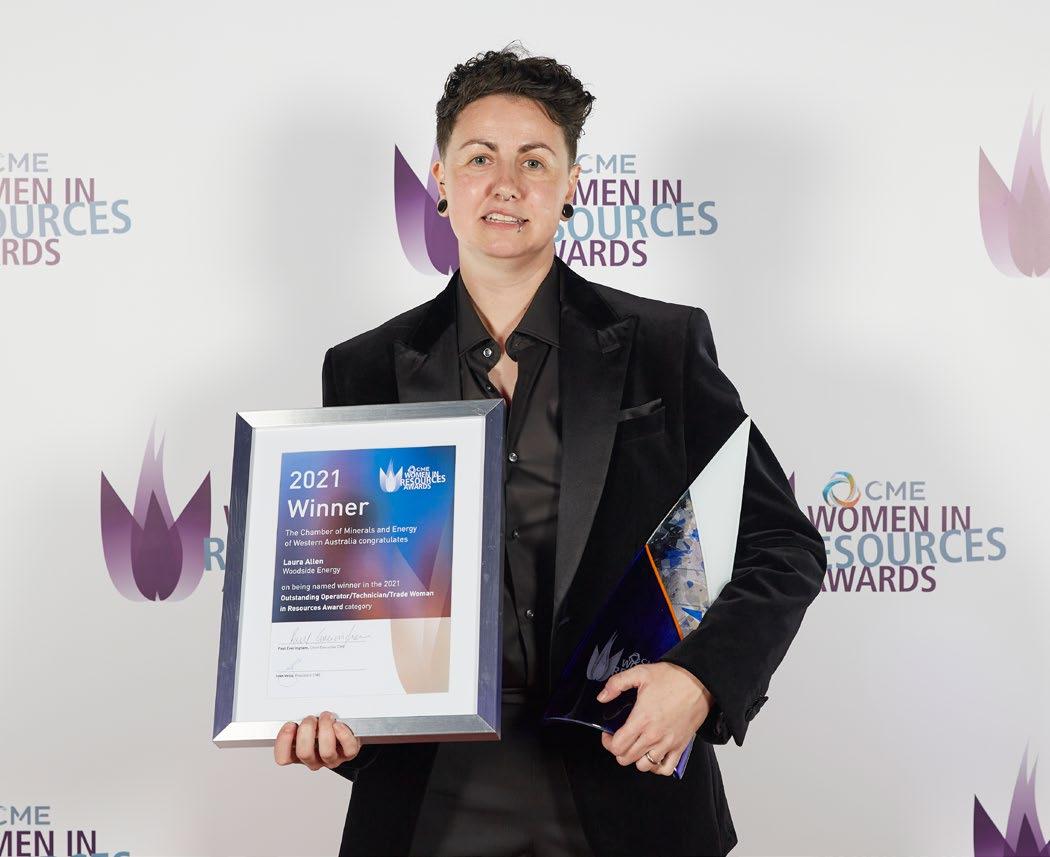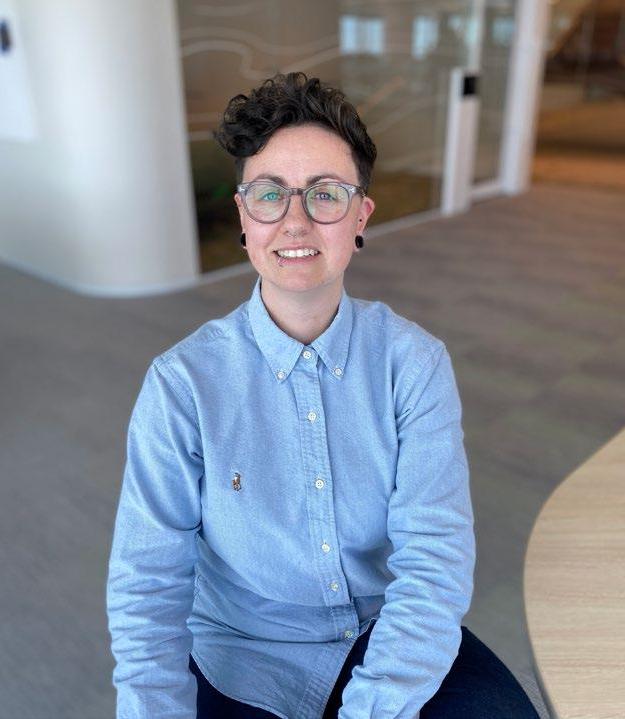
8 minute read
Being and Electrician – It’s Not Just a Job; It’s a Career
BEING AN ELECTRICIAN
It’S NOt JUSt A JOb; It’S A CAreer
SINCE STARTING HER ELECTRICAL APPRENTICESHIP TWENTY YEARS AGO, LAURA ALLEN HAS DEVELOPED A REPUTATION FOR HER ENTHUSIASM, PASSION FOR THE ELECTRICAL TRADE AND NATURAL LEADERSHIP.
Formerly an Electrical Group Training (EGT) apprentice, she has worked in a variety of roles within the resources sector, purposefully finding new opportunities and never being afraid to give something new a go. EGT was pleased to interview Laura, where she shared her exciting journey, the lessons learned and her insight that being electrician is not just a job, it’s a career.
What are some of the highlights of your career?
When I started my apprenticeship, I was so excited. I just wanted to be a sparky and I loved that I was getting paid to learn and work with my hands. I worked in Perth with different host employers across the domestic, commercial, construction and industrial sectors. Then I set my sights on working up north. At the time, it was unusual for a female apprentice to be sent to site from Perth, but I really wanted to work there, so I decided to move to Karratha. Once I had somewhere to live, EGT arranged a placement for me at a host contractor on a Pilbara Iron site where I stayed until after I completed my apprenticeship. I then spent 18-months working in communications and fibre optics, before going to work with a contractor at the Karratha Gas Plant, in a lighting campaign team. It was there that I got my hazardous areas certificate and on-the-job experience working with instrumentation electricians. The next step involved obtaining my instrumentation accreditation.
Having these skills positioned me for offshore work, and after the challenges of getting my foot in the door, I spent twelve years working in a variety of roles. Woodside became the vessel owner in 2012, and I completed two projects in Singapore with this vessel. I also worked my way up to being the Registered Person Electrical (RPE). That was a major milestone for me and for Woodside too, as I was the first female to work in that role. My next step was to cross into operations and from there I became Woodside’s first offshore female Process Maintenance Coordinator (PMC).
It was after my second project in Singapore that I took a temporary transfer into my current role at Woodside’s Perth office. I’m a Process Owner and I am responsible for overseeing all of the operations processes for seven assets, both on and offshore. I assess and manage operational risks and support managers in the safe running of all their assets. It’s been a fantastic and exciting opportunity. I’m almost at the end of my transfer and I’m waiting to see where I’ll go next. I want to keep growing, learning and building my skills.
You’ve actively looked for growth opportunities in your work.
Yes, I have. Not long after I became a tradesperson, we were going into a shut down on site and three of the team weren’t available to work. That left me, the Site Manager and his wife who was a labourer. The Site Manager was set to cancel the shut, but I assured him that his wife and I could do the work. He wasn’t convinced, but I believed the work was within my capabilities, so he agreed we could get started. He left site to go and find other tradies to give us a hand, but by the time he came back, we’d completed all the work including the testing and lock off. Everything was ready to go back online. Following our success my employer offered me a Leading Hand role; however, I had an ‘aha’ moment and decided to resign. I realised I was always going to be seen as the ‘apprentice’ on that site
despite having become a fully-fledged electrician and felt I wouldn’t grow if I stayed. Each time I’ve mastered my role, I’ve started looking for the next challenge.
And the challenges haven’t always been electrical ones.
When I worked in communications and fibre optics, I travelled on my own all over the northwest. It was lonely at times. I’d be driving six to eight hours by myself through the desert. There was no one to bounce ideas off, and working solo gave me a true understanding of myself and my capabilities. Sometimes it was scary. One time, I’d just left Port Hedland, and there was a rogue cow on the road. I slowed and it ambled into the bushes, but as I passed, it charged me and hit the car. The police attended the site, dealt with the cow, then left me to wait (in my now undrivable car) for my boss to arrive. Not long after they left, the herd arrived out of nowhere and started rocking the car. When I got out, they followed me until I climbed a tree. Luckily four guys turned up in a vehicle and scared the herd off, except they then started to raid my car. I’d left my valuables on the dashboard so leapt out of the tree to stop them. I was in a very vulnerable situation. Fortunately, it all ended well. My boss wasn’t too far away and he arrived soon after they left, but it was a long tow back to Karratha. The fact is, no one prepares you for situations like that. You think you’re prepared for life, but so many things happen that you don’t expect. You have to be resourceful and courageous.
You’ve been described as a natural leader. How have you developed your leadership skills?
Becoming a Leading Hand at the Karratha Gas Plant taught me what leadership really meant. As a Leading Hand, you’re often caught in the middle, reporting to managers, but also looking after a team. At this stage I was twenty-two, highly motivated and determined to succeed. I was setting hard targets and expecting the world from my team, who didn’t respond well to my approach. One day I went home particularly discouraged, wondering what was happening. At our team meeting the next day, I apologised for how I’d approached things and asked for the team’s help. I told them I was there for open feedback; I wanted to be a good boss, not their enemy. I asked them what it would take. This was a real turning point. All my team-members were experienced leaders. They were using their skills, earning good money and were very proud of their work. They’d ‘iced me’, not because I was young or female or gay, but because of how I’d approached them. I hadn’t appreciated what their work involved and the finesse it required. They took me under their wing and I learned from the best. It built my leadership qualities and took me to the next level.

Earlier this year, your industry leadership was recognised when you won a 2021 Chamber of Minerals and Energy of Western Australia Women in Resources Award. Can you tell us about that?
I won the Outstanding Operator/ Technician/Trade Woman in Resources Award, which recognises women who have broken new ground for women in nontraditional fields and contributed to the resources sector and broader community. Since then, I’ve had the chance to present to a number of industry forums including the Australian Oil and Gas Conference, Women in Mining and Resources Leadership Summit and Women in Mining in the Pilbara Forum. When I wrote the submission, it made me reflect on my career. I realised I’ve achieved a lot without stopping to reflect on this – I’ve had to work hard at every gate. In my roles, hurdles often looked like blockers and sometimes it felt like people were trying to stop me. I realised these obstacles were actually enablers that made me think more laterally, work harder and be more effective. I’ve had to navigate many challenges, but they don’t define me. It’s the negative experiences that have taught me the most and helped me to grow.
How did doing your apprenticeship through EGT contribute to your success?
The best thing about EGT, was rotating through different host employers and industry sectors. The exposure to so many areas gave me the foundation for everything I’ve done in my life. Doing metropolitan domestic work may seem a long way from working offshore, but I’ve drawn on all the experiences my apprenticeship gave me. Working offshore has relied on my industrial skills, domestic experience to support the residential sections and construction skills when we took the vessel to Singapore for refurbishment. It all linked back to the fundamentals from my apprenticeship. Being able to move around, rather than stay in a single sector, has made all the difference to my technical career. It also kept my mindset open, rather than narrowing my focus to any one part of industry.
What advice would you give to current apprentices?
Being an electrician is a career rather than just a job. When you become an apprentice, the goal is to get your ticket and become a tradie, but it’s actually much bigger than that. I didn’t realise that until I was well down the path. You can start as a housing sparky and end up as an offshore manager if you work hard. You have to be on the lookout, be open and never say no. If you want something, and someone says no, then find another way to work towards your goal. It’s all about the journey, which for me is never ending. I thought I’d be an electrician forever, but now I’m in an office managing risk across multiple assets. Doing an apprenticeship is a bit like getting the key to the kingdom. Once you unlock the door, it’s up to you about what you do, how you use it and where you want to go.
To have your inspirational story told, contact Aimee Hills at aimee.hills@ecawa.org.au.










